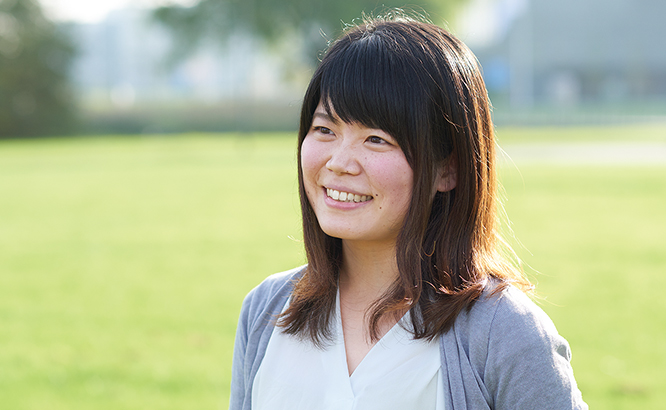I Want to Become a Person Who Advances ICT-Mechanical Collaboration
Sakura Tomita
Instrumentation and Control Technology Center (Human Resources Department trainee), Wageningen University & Research (The Netherlands), Visiting Researcher

Applying my knowledge of sensor technology from graduate school to solve agricultural issues
In graduate school, I studied sensor technologies in a department of agriculture. When I went to find a job, I considered places in which I could apply my expertise in sensor technology to resolve issues faced by people in workplaces. One field that attracted my attention was precision farming and farm machinery. A professor from my laboratory would often talk to me about precision farming, and I was always very impressed by its enormous potential. If we could make precision farming happen, I was told, we would then be able to offer solutions to issues facing farmers on a daily basis. This in turn would contribute to the sustainability of agriculture not only in Japan, but also throughout the entire world. I was so attracted to the potential presented by this area that I decided to become a precision farming researcher. I chose Kubota because I empathized with its “Priority Onsite” principle and, since it operates globally, I thought that I would be able to accomplish something to resolve the world's agricultural problems.
After I joined the company, I was assigned to a section working on precision farming (hereinafter “PF,” which is also referred to as smart farming (“SF”) at Kubota) as I had wished. There, I was a member of a research team on PF, in which Kubota was seeking opportunities for the rice farming market at the time. Our research bore fruit in the form of the Kubota Smart Agri System (KSAS), which supports farmers and service staff. Of the many projects that we worked on, I was in a group doing basic research on automatic operation for a “taste-yield combine harvester,” which is now on the market. Since I built up my knowledge of software as well, I was able to broaden my technological skills.
-

With an academic advisor at her host institute of Wageningen University & Research
Field research on European PF in the Netherlands
In the spring of 2015, a cross-sectional project on PF in Europe and North America was launched, and I was among those who joined the team. Then, in the autumn of that year, I was sent as a trainee for two years to Wageningen University & Research, with which I am now affiliated, with the main purpose of extending my research on PF in Europe. Meanwhile, I am expected to follow up on the European/North American PF project, and so I investigate trends in the PF market in Europe. I also attend various conferences and am actively working in a variety of different fields. I have attended largescale ICT trade fairs to absorb knowledge and information on ICT, visited farm machinery factories in Europe to actually touch the farm machines there, and conducted surveys of French farmers. As a result, I have come to realize how important it is to visit actual farming sites. I feel the difference between the Netherlands and Japan most keenly at conventions and meetings because, in the Netherlands, no one will pay any attention to you unless you speak out. Because of this, I have now become more proactive in speaking my thoughts and opinions than when I was in Japan. When I return home, I hope to involve others as an engineer/coordinator who is well versed in both mechanics and ICT, so that I can promote collaboration between those two areas.